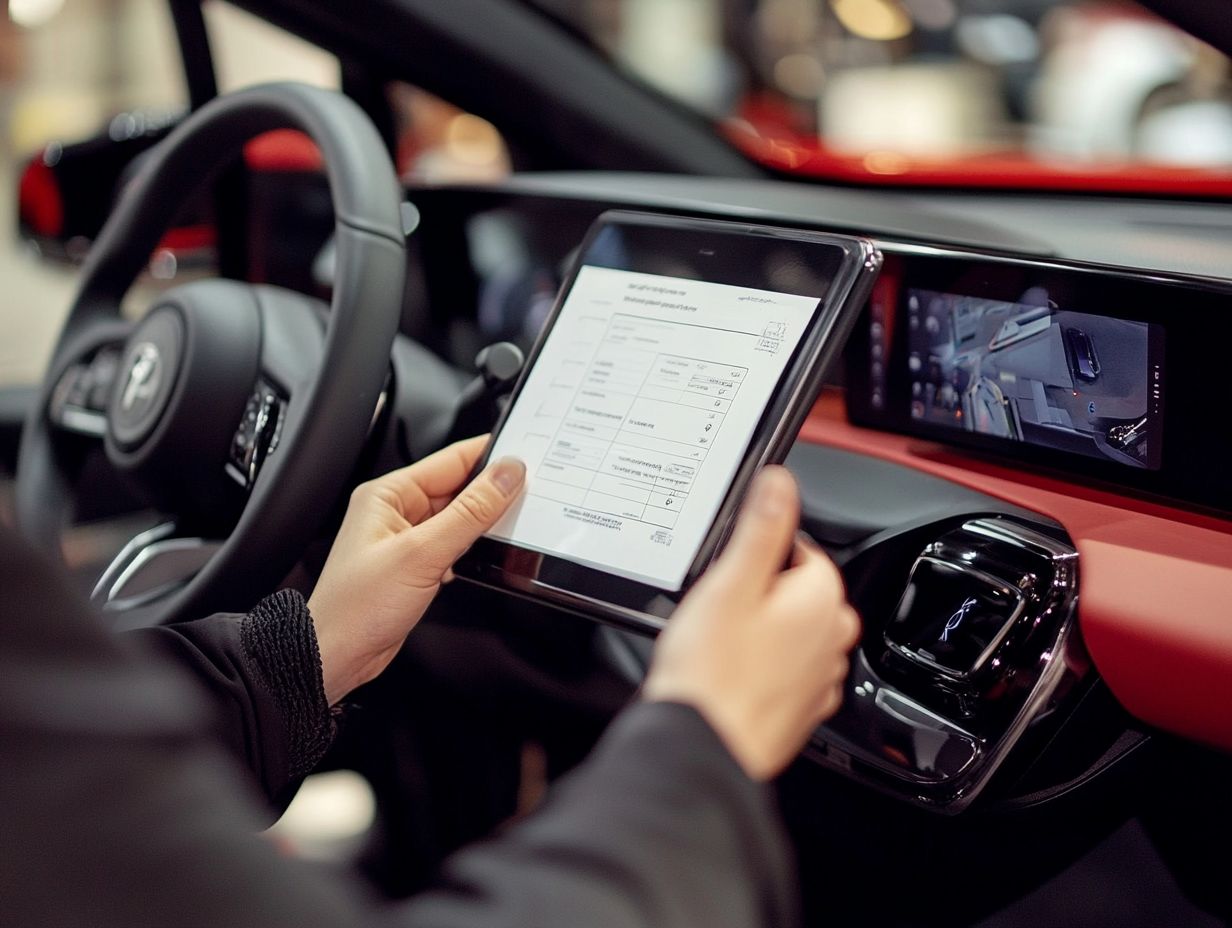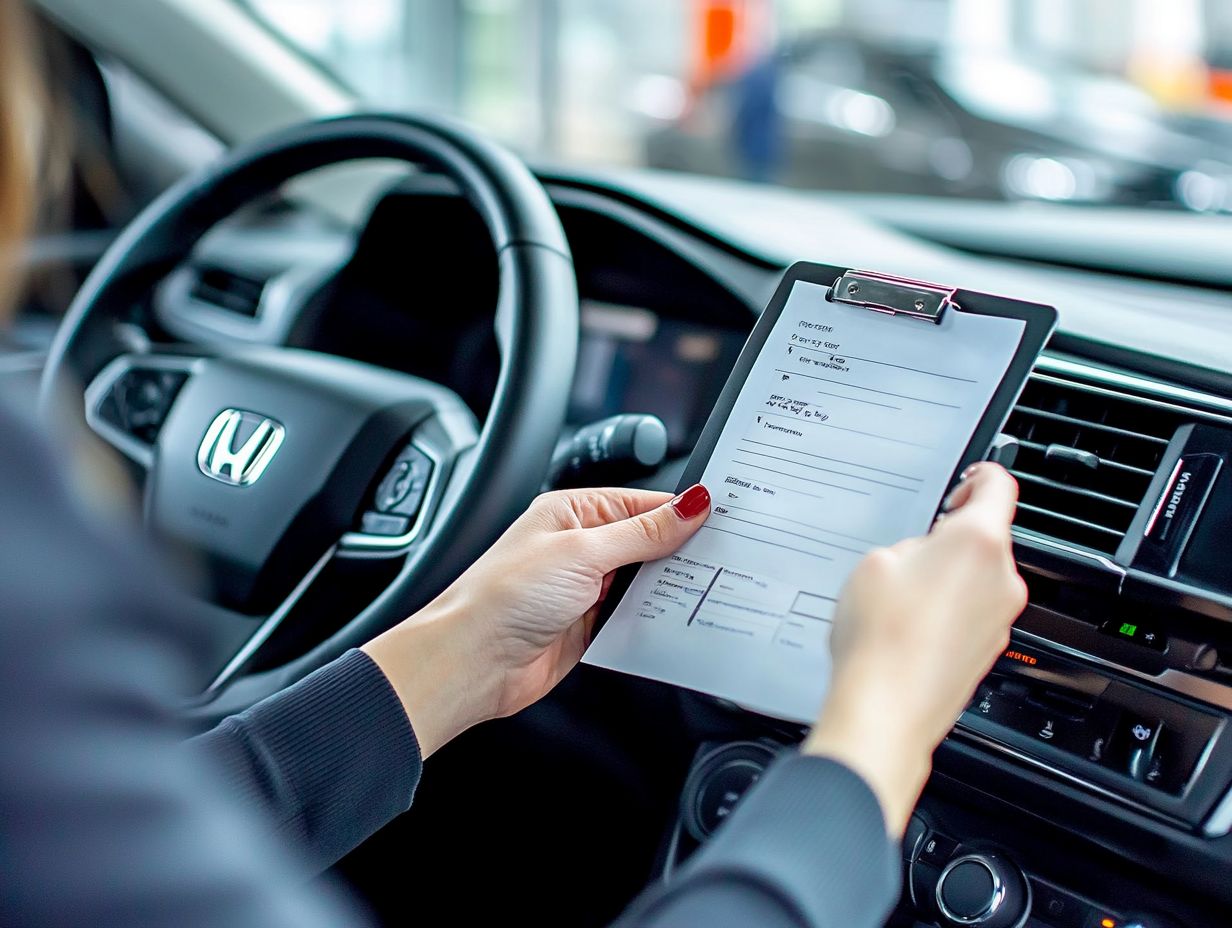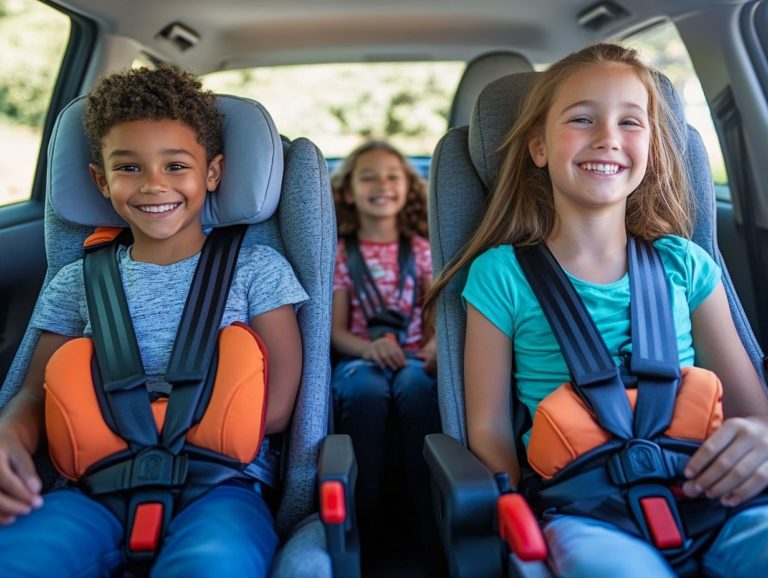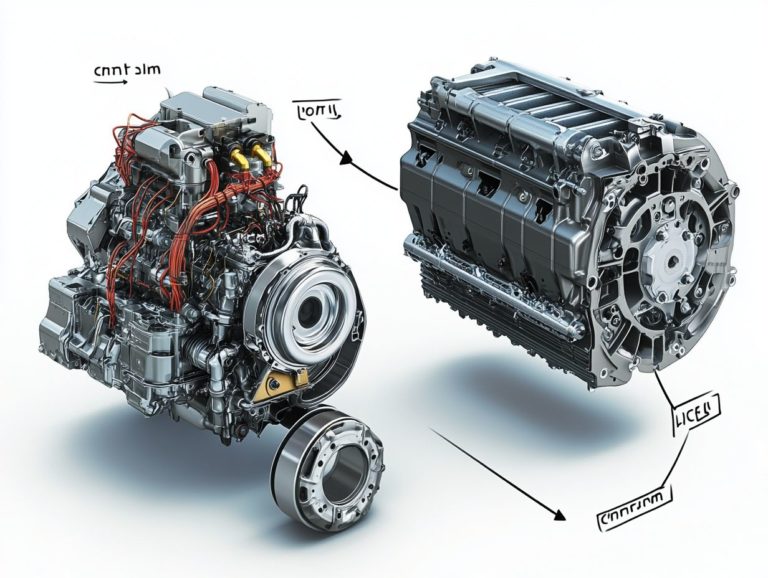Best Features to Look for in a First Car
Choosing your first car is both an exhilarating and intimidating journey. With a multitude of options available, it s vital to reflect on the key features that resonate with your lifestyle and budget.
You should consider factors such as affordability, reliability, safety features, and fuel efficiency. The perfect vehicle will not only cater to your needs but also provide you with comfort and convenience.
This guide will assist you in evaluating the most crucial aspects, ensuring you make an informed decision for this important milestone. Dive in now! Discover what truly matters as you seek your perfect first car!
Contents
- Key Takeaways:
- 1. Affordability
- 2. Reliability
- 3. Safety Features
- 4. Fuel Efficiency
- 5. Size and Maneuverability
- 6. Comfort and Convenience
- 7. Technology and Entertainment Features
- 8. Insurance Costs
- 9. Resale Value
- 10. Warranty and Maintenance Coverage
- 11. Environmental Friendliness
- 12. Performance and Handling
- 13. Style and Design
- 14. Personal Preferences
- 15. Overall Value for the Price
- Frequently Asked Questions
- What are the best features to look for in a first car?
- Why is reliability an important feature in a first car?
- What safety features should I look for in a first car?
- Why is fuel efficiency important in a first car?
- How can I find an affordable first car with good features?
- What features should I look for in a first car?
Key Takeaways:

- Affordability is crucial when looking for a first car, so check your budget and opt for a reliable vehicle that won’t break the bank.
- Prioritize safety features when choosing a first car, such as airbags, anti-lock brakes, and rearview cameras, to ensure a secure driving experience.
- Look for a car with good fuel efficiency to save money on gas and reduce your environmental impact.
1. Affordability
Affordability is a key consideration when you re thinking about buying a car, whether it s new or used. It plays a significant role in shaping your entire car ownership experience and financial well-being.
Before diving into a purchase, check your budget and understand car loans. Determine your monthly payment to make an informed choice. This groundwork will enable you to select a vehicle that won t strain your finances down the road.
It’s exciting to explore different financing options, including loans from car dealerships and traditional banks. While dealerships may offer promotional rates that sound tempting, compare these with bank loans, which could have more favorable terms.
As you assess potential costs, don t overlook the importance of budgeting for insurance rates, as they can vary significantly based on your driving history and the type of vehicle you choose. Also, keep potential maintenance costs in mind.
By considering all these factors, you can arrive at a comprehensive budget that ensures you make a wise choice aligned with your financial capabilities.
2. Reliability
When you’re evaluating potential vehicles, reliability emerges as a crucial factor that can greatly influence your satisfaction, especially when it’s your first car. For insights on the best cars for new drivers, taking the time to thoroughly assess this aspect can significantly ease your worries and elevate your overall experience.
One effective way to gain insight into a vehicle’s reliability is by utilizing vehicle history reports from reputable services like Carfax. These reports offer essential details about prior accidents, service records, and previous ownership, enabling you to make informed decisions.
Check reviews and expert ratings on platforms like Edmunds for insights into the performance and durability of various brands and models. Consistently reliable brands often garner favorable feedback, making them an appealing choice for anyone seeking a hassle-free ownership journey.
3. Safety Features
When selecting a vehicle, safety features to look for in family cars should be at the top of your list, as they not only protect you but also safeguard your passengers, especially if you’re a new driver.
In today s automotive landscape, there’s a wealth of safety innovations aimed at enhancing your driving experience and reducing risks on the road. Modern cars are equipped with cutting-edge technologies like adaptive cruise control, lane-keeping assistance, and automatic emergency braking. If you’re considering an electric vehicle, you ll discover added benefits, including improved stability and regenerative braking, which means the car uses energy from braking to recharge its battery.
It’s crucial to pay attention to ratings from the Insurance Institute of Highway Safety, as these evaluations offer valuable insights into a vehicle s performance in crash tests. When you visit a dealership, feel free to ask about these safety features directly. This way, you can make informed decisions that cater to your specific needs.
Have questions or want to share your experience about choosing a first car? Feel free to reach out!
4. Fuel Efficiency
Fuel efficiency is a vital factor to consider when you’re in the market for a new car, especially with rising fuel prices. If you’re keen on reducing both your environmental footprint and fuel expenses, this aspect is crucial.
With many car options available today, it’s essential to grasp how traditional gasoline cars, electric vehicles (EVs), and hybrids perform in terms of fuel efficiency. Each type has its own benefits and drawbacks that can notably affect your short-term costs and long-term savings.
For example, electric vehicles (EVs) often boast lower operating costs thanks to minimal charging expenses. Familiarizing yourself with the availability of public charging stations can help you maximize your savings.
Hybrid vehicles offer unique flexibility, allowing you to enjoy gasoline savings while still benefiting from electric power. To enhance your fuel efficiency, adopt mindful driving habits such as proper maintenance, gentle acceleration, and making savvy choices between filling up at gas stations and using available charging networks.
5. Size and Maneuverability

The size and maneuverability of your car can greatly impact how much you enjoy driving, particularly if you’re a new driver or navigating busy urban landscapes.
Take SUVs for example. They offer enhanced visibility and generous cargo space, making them an excellent choice for families or those who love hitting the open road. However, their larger footprint can present challenges when squeezing into tight parking spots or managing congested city streets.
Minivans, on the other hand, are designed for accommodating larger groups. With spacious interiors that prioritize comfort, they are ideal for family outings or carpools, ensuring everyone enjoys the ride.
Then there are sedans, which are the stars of urban driving. Their compact size allows for effortless parking and nimble maneuvering through traffic, making them the go-to option for city dwellers who value efficiency and convenience.
6. Comfort and Convenience
Comfort and convenience play a crucial role in your vehicle selection, especially if you anticipate spending considerable time behind the wheel, whether as a commuter or a family on the go.
As you explore your options, evaluate features like high-quality seating materials that can enhance your overall driving experience. Luxurious leather or breathable fabrics provide exceptional support during lengthy drives. You’ll want ample interior space to ensure everyone and their luggage can travel comfortably.
Advanced climate control systems maintain a pleasant atmosphere inside, no matter what s happening outside. Modern infotainment systems further enrich your experience, offering seamless access to navigation, music, and hands-free communication.
Let s not forget strategic storage solutions that help keep your essentials organized, catering perfectly to both your daily commute and family adventures. Explore our top picks for family-friendly vehicles today!
7. Technology and Entertainment Features
Modern vehicles come equipped with cutting-edge technology and entertainment features that elevate your driving experience, making it enjoyable and deeply connected.
Imagine the convenience of Bluetooth connectivity, allowing you to link your smartphone effortlessly. You can make hands-free calls and stream your favorite music without missing a beat. Sophisticated navigation systems keep you informed with real-time traffic updates and turn-by-turn directions, catering perfectly to those who value efficiency and exploration.
Safety technologies, such as a system that automatically adjusts your car’s speed to match the traffic flow and lane-keeping assistance, provide that extra layer of reassurance for those who prioritize both convenience and security. Together, these features create a driving environment that meets various personal preferences while enhancing overall convenience, ensuring that every journey is smoother and more enjoyable.
8. Insurance Costs
Understanding insurance costs is crucial for budgeting your car purchase. It directly affects your monthly payments and overall financial commitment.
Different vehicles have varying insurance rates due to their design, safety features, and repair costs. For instance, a compact sedan usually has lower premiums than a high-performance sports car because of the different risks involved.
To find the best quotes, gather multiple estimates from various insurers. Consider factors like the vehicle’s history, including any prior accidents or claims, and safety features like anti-lock brakes or advanced airbag systems.
Understanding these elements helps you make informed decisions and potentially unlock better savings.
9. Resale Value
Evaluating the resale value of a car is a smart move, especially if you plan to sell or trade in later. Knowing how to assess this value impacts your financial outcome.
As a buyer, check reliable resources like Kelley Blue Book and Edmunds. They provide insights into current market trends and vehicle valuations.
Factors such as the car’s make, model, age, mileage, and overall condition heavily influence its resale potential. Market demand and technological features also play a significant role.
Researching these elements allows you to make informed choices, ensuring your vehicle retains its worth for years.
10. Warranty and Maintenance Coverage

Warranty and maintenance coverage are key considerations when buying a vehicle. They can save you money and provide peace of mind during ownership.
Understand the different types of warranties available for new and used cars. New vehicles often come with comprehensive manufacturer warranties, while used cars may have limited coverage or be sold ‘as-is.’
Evaluate maintenance coverage options as they vary by dealership. Some offer free maintenance for a specific period or mileage.
Being aware of these details can lead to long-term benefits, helping you avoid unexpected costs and ensuring your vehicle remains reliable.
11. Environmental Friendliness
Environmental friendliness is increasingly important in car-buying decisions. With the rise of electric and hybrid models, minimizing carbon footprints is now easier than ever.
You likely understand how your choices affect the planet. Seek vehicles that offer efficiency and align with a sustainable lifestyle.
Choosing cars with eco-friendly technologies helps contribute to cleaner air and reduced greenhouse gas emissions. Many regions offer incentives and rebates to ease the financial burden of greener options.
These modern cars reduce your environmental impact while providing a variety of options from compact models to spacious SUVs catering to your unique needs.
12. Performance and Handling
Performance and handling are crucial elements that can dramatically influence your driving experience. Test drives are a critical part of the car-buying journey.
A vehicle’s acceleration, braking, and steering responsiveness serve as essential indicators of its performance. Handling refers to how well a vehicle navigates turns and adapts to various road conditions.
These attributes ensure safety and enhance your enjoyment during every drive. By taking a prospective vehicle for a test drive, you can assess these features up close.
You will observe how the car responds during acceleration and whether it maintains stability while maneuvering through corners. Test drives also let you evaluate the interior comfort and technological features.
13. Style and Design
The style and design of your vehicle can profoundly impact your satisfaction and image. This makes it a crucial consideration in your purchasing decision.
For example, a sleek sedan might project professionalism, while a spacious SUV embodies versatility and adventure. Hybrids attract those who value sustainability without compromising style.
The visual appeal of a car influences its resale value. Models with striking designs typically retain their worth better than less attractive counterparts.
Selecting a vehicle that aligns with your taste elevates your driving experience and can represent a wise financial choice.
14. Personal Preferences
Your personal preferences significantly impact your car-buying journey. They affect everything from the type of vehicle you select to the specific features that appeal to you.
Reflect on what resonates with your style and lifestyle as you navigate the options. Your choice of color can be a true reflection of your personality.
Interior choices matter too. Luxurious leather seats or cutting-edge infotainment systems can elevate your driving experience.
Technology features like advanced safety systems align with your values around safety and sustainability. When your selections align with what truly matters, it enhances your satisfaction and connection with your vehicle.
15. Overall Value for the Price

Determining the overall value of a vehicle in relation to its price is crucial for an informed purchasing decision. This involves fitting your choice within your budget and financing options.
When evaluating features against costs, adopt a careful consideration. Consider not just the sticker price but also ongoing expenses tied to vehicle ownership.
Insurance premiums, maintenance costs, and fuel efficiency significantly influence the true cost of a vehicle. A car with a lower initial price might have higher insurance rates or frequent repair needs.
Therefore, take a comprehensive view to determine if you re genuinely getting the best value for your money.
Frequently Asked Questions
What are the best features to look for in a first car?
Some of the best features to look for in a first car are reliability, safety, fuel efficiency, and affordability.
Why is reliability an important feature in a first car?
Reliability is important in a first car because it ensures that you have a vehicle that you can depend on to get you from point A to point B without any major breakdowns or repairs. For more insights, check out these tips for first-time new car buyers.
What safety features should I look for in a first car?
When looking for a first car, it’s important to prioritize safety features such as airbags, anti-lock brakes, and key features to compare in cars like electronic stability control.
Why is fuel efficiency important in a first car?
Fuel efficiency can save you money on gas over time.
Plus, it helps keep our planet green!
How can I find an affordable first car with good features?
Start by doing your research and comparing prices.
Consider buying a reliable used car from a trusted dealership or private seller.
What features should I look for in a first car?
Look for features like Bluetooth, a backup camera, and a great sound system.
These can make your driving experience more enjoyable!






